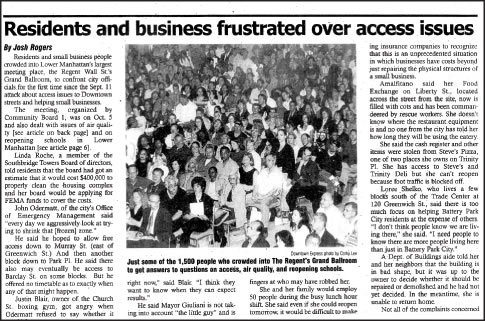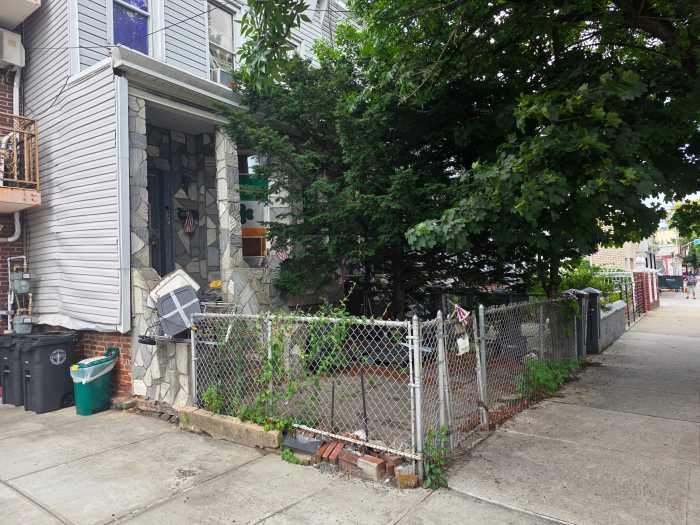By Claude Solnik
“Residents and business frustrated over access issues”
Downtown Express,
Oct.9-22, 2001
Residents and small business owners crowded into the regent Wall St.’s Grand Ballroom, Lower Manhattan’s largest meeting space, on October 5, 2001, to confront city officials for the first time since the Sept. 11 attacks about access issues to Downtown streets and helping small businesses. The meeting also dealt with air quality issues and the issue of school reopenings.
John Odermatt of the city’s Office of Emergency Management said he hoped to allow free access down to Murray St. but couldn’t offer a timetable as to when access to other blocks such as Barclay St. would be permitted.
When Odermatt added that he could not say whether or not it would be a matter of one day or six months before the frozen zone was reduced further, Church St. boxing gym owner Justin Blair grew angry, noting that he had to lay off employees and expected to lose many more big accounts. He added that Mayor Giuliani wasn’t taking “the little guy” into account and was mainly concerned with helping big businesses.
Vivia Amalfitano owned three fast good stores that had been closed since the attack, and anticipated a loss of many clientele as her frequent customers all worked in the Twin Towers. Her restaurant, Food Exchange, located on Liberty St., was commandeered by rescue workers and full of cots. Nobody from the city would tell her how long they would be using her eatery.
One of the two restaurants she owned on Trinity Pl., Steve’s Pizza, experienced robberies of items such as the cash register.
Southbridge Towers board member Linda Roche told residents that the board had received an estimate that it would cost $400,000 to properly clean the housing complex.
Loree Shelko, a resident at 120 Greenwich St., complained that there was too much emphasis placed on helping those in Battery Park City and not enough attention being paid to those who do not live in B.P.C. but are in close proximity to Ground Zero.
Not all complaints were home and business related; one B.P.C. woman was in tears because she wasn’t able to thank the firefighters stationed on Liberty St. for rescuing her on Sept. 11. City officials said they would make sure to get the message to them.
“Connor taking top Senate post”
Downtown Express,
Oct. 11-24, 1994
Democratic State Senator Martin Connor, who represented sections of Brooklyn and Lower Manhattan for 16 years, rounded up enough votes to become the new Senate minority leader. At the time, he had heard from the entire Democratic delegation and had commitments from at least 17 of the 26 members. The Senate Democrats planned to hold a conference after the Nov. 8 election and take an informal vote on the leadership, to be followed by an official vote on the floor of the Senate in January.
Connor said his priority would be to fight to reform the way the Senate conducted people’s business, but since Democrats were outnumbered by Republicans 25 to 36, the question remained as to whether it would be a symbolic rather than true legislative strength.
“You could have a perfectly worthwhile bill that never sees the light of day because the Republicans have decided they will not let any Democratic bill come out of committee,” said Amy Solomon, legislative director for Connor. “They have complete control over what bill will or will not be brought to the Senate floor for a vote. It could just stay in committee for 15 years and never be debated.”
A health reform bill, among others, was stymied, but Connor said he would push for the kind of reforms that would break the gridlock.
“The time has come to open the legislative process in the Senate,” he said, “to insure public input and a true legislative democracy that puts the public first.”
The State Legislature was not required to provide quarterly reports of expenditures, but Connor and others wanted to itemize legislative expenses.
“He’s going to play hardball,” said Solomon. “There is a legislative package and he thinks it can make a difference.”
He was first elected to the State Senate in 1978 and always served in the minority. After 30 years in office, Connor lost the Democratic primary to Daniel Squadron last year. Squadron joined a Democraic majority for the first time in decades.
Prepared by Helaina N. Hovitz


































